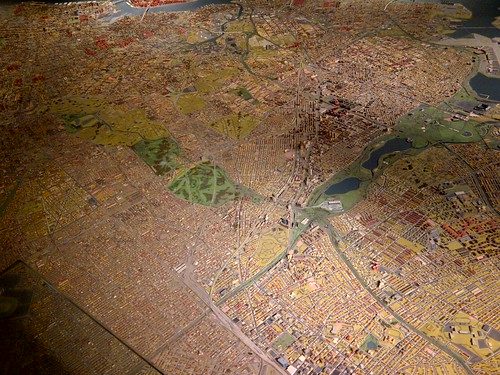The Mostly Mozart Festival began at Lincoln Center in 1966 and I’ve wanted to attend since then and now I finally have. Maybe next year I’ll spring for a package to see several of the orchestra, opera, and dance performances and the films. The Festival’s first two seasons were devoted to the music of Mozart but now Mozart’s contemporaries, predecessors, and successors are included. The Mostly Mozart Orchestra is the only orchestra in the US dedicated to the music of the European Classical period.
While I was waiting for Joe to show I watched the new Lincoln Center fountain do its little dance. What a romantic place. [sigh] I need a boyfriend.
This year the Festival’s theme is “Celebrate Beethoven” so I knew it would be perfect for my friend Joe and me since he loves Beethoven and I love Mozart. Beethoven was a huge fan of Mozart and was supposed to study with him. There are notes that Beethoven wrote in a score that say, “Stolen from Mozart.”
The Tuesday night performance was the opening but on the Saturday before the orchestra put on a short free performance. Joe stood on line and went himself. He got a seat on the stage, which I had avoided when I bought our seats because, as a sound engineer, I couldn’t see sitting behind the orchestra. Joe loved those seats – he said you could feel the vibration of the instruments and you could watch conductor Louis Langrée, who conducted and spoke with passion.
On Tuesday night we were sitting right second tier towards the back. They’re not great seats because the view is obstructed but they were affordable seats. Looking at the stage I noticed a few things. The audience behind the orchestra looked like a chorus getting ready to stand up and sing at any time. Since the orchestra had to be moved downstage in order to make room for the seats, diffusors had been set up above them (the orchestra wasn’t in the proper place on the stage to achieve the best sound). Because of the diffusors there were no seats sold in the right or left third tier (the diffusors were below the third tier level). Why not just sell the side third tier seats and take the people off the stage?
The night opened with Beethoven’s “Overture to Coriolan,” Op. 62. I’d seen the NY Philharmonic perform this before. It’s a beautiful piece with the entire lifetime of soldier told in just eight minutes. Next was Mozart’s “Ch’io mi scordi di te…Non temer, amato bene,” K.505 – an aria not written for an opera. Mozart wrote it as a farewell to singer Nancy Storace (the original Susanna in Le nozze di Figaro) as a duet for Storace and himself with the piano ‘singing’ his part. Alice Coote (mezzo-soprano) is a wonderful singer and Jean-Efflam Bavouzet (piano) was brilliant. The piano and voice talk to and around each other. The first half ended with Beethoven’s “Piano Concerto No. 4” in G major. It is a great showpiece for a brilliant pianist and Bavouzet is a brilliant pianist. He was also the cartoon stereotype of a classical pianist going up and down the keyboard. There was major applause after the second movement because of his otherworldly solo. Parts of the solo reminded me of Gershwin and I wondered if he had noted in the score for “Rhapsody in Blue” that he had stolen from Beethoven. Joe said that the piece felt like it wasn’t going anywhere. I agree but the playing was so captivating that I was carried away and forgot that there was no destination in sight.
The second half opened with Mozart’s “Parto, parto, ma tu ben mio” from La clemeza di Tito, K.621. Principal clarinetist Jon Manasse soloed with Coote on this aria. As I said, Coote is great singer but she’s not a great actress. It was difficult for me to feel whatever she was feeling. The clarinet finishes sentences and then both the voice and the clarinet sing together for a fabulous ending. The evening ended with Beethoven’s “Symphony No. 7” in A major, Op. 92. The last time I heard this piece was a few years ago in Central Park. Outdoors in a party atmosphere it was difficult to hear the dynamics. Now I could hear the flutes and violins play very softly while answering each other. It is another beautiful piece by Beethoven and Langrée conducted without a score. His body covered the entire stand as he moved from side to side and front to back. His passion for this piece was very much on display.
Don’t ask me why I waited so long to attend the Mostly Mozart Festival. Now that I’ve finally gone, I hope to continue the tradition every year.
By Carene Lydia Lopez






